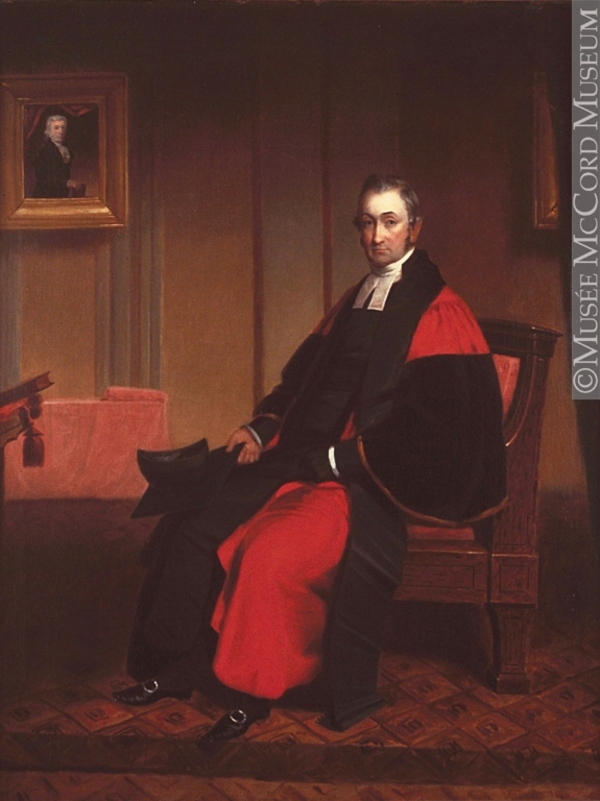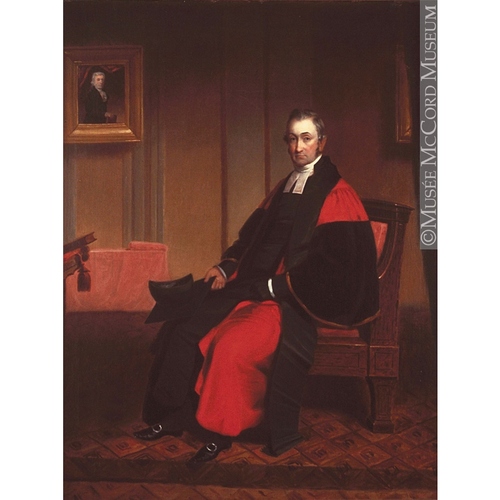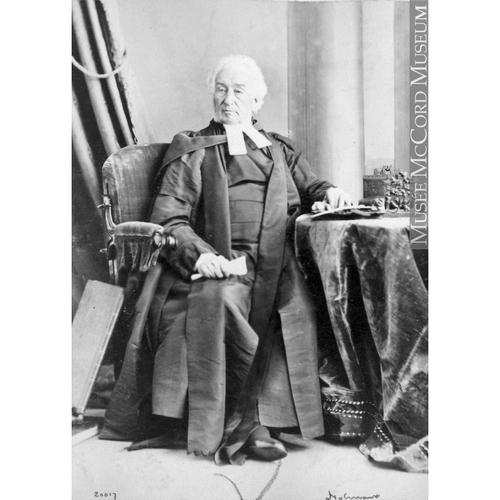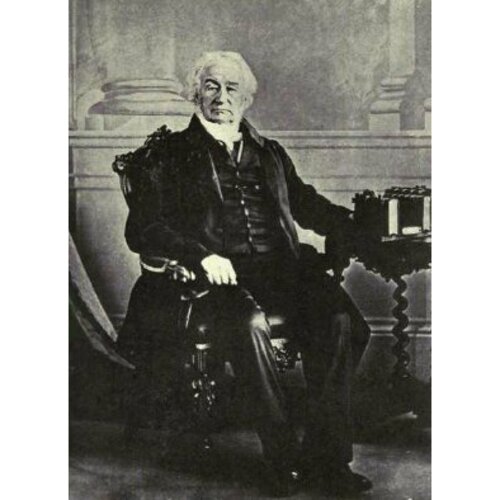
Source: Link
BETHUNE, JOHN, Anglican clergyman, dean of the diocese of Montreal, acting principal of McGill University; b. 5 Jan. 1791 at Charlottenburg (Williamstown), U.C.; d. 22 Aug. 1872 in Montreal, Que.
John Bethune, brother of Alexander Neil Bethune, was the third son of Véronique Waddin and the Reverend John Bethune*, a minister of the Church of Scotland. During the American Revolution, the elder Bethune served as chaplain in the 84th Regiment (Royal Highland Emigrants). Upon its demobilization he took up residence in Montreal, and in March 1786 organized that city’s earliest Presbyterian congregation (later First Presbyterian Church of Montreal). In 1787 he moved to the Scots and American royalist settlement in Glengarry, west of Lake St Francis.
John Bethune the younger was schooled by the Reverend John Strachan* at Kingston and Cornwall, and later taught under him. Having been received into the Church of England, he studied for holy orders under Strachan’s direction. He was the first product of the Church of England’s “Experiment in Home Education,” the training of Canadians for the ministry. He served the Cornwall Anglicans as a layreader between 1812 and 1814, when he was ordained in Quebec’s Holy Trinity cathedral by Bishop Jacob Mountain*. He was then posted to the mission of the townships of Augusta and Elizabethtown, the latter of which contained the substantial settlement of Brockville, and was “adopted” by the Society for the Propagation of the Gospel. An active missionary, he served his own district and itinerated widely beyond it among the Rideau River settlements. At the same time, he taught in the Eastern District grammar school, Cornwall. At this stage of his career Bethune appears as the protégé of Strachan, like the master “rather sanguine and partial in views” on the status of the Church of England.
In 1818 Bethune was posted to Montreal as minister of Christ Church and first rector of the Anglican parish of Montreal, which the provincial government had set up that year, its boundaries to be coterminous with those of the Roman Catholic parish of Notre-Dame. The parishes included all of the city of Montreal and its suburbs. As rector, Bethune made his presence felt. The new Christ Church, begun on Notre-Dame Street in 1805, was completed and freed of debt. It was consecrated in 1830 by Bishop Charles James Stewart*. Bethune multiplied agencies depending on Christ Church, many of which, though operated by that church, performed services open to all Montrealers. He organized a Sunday school, which also supplied secular instruction for adults. Aided by the National School Society, in 1819 he established a monitorial school (one in which the senior pupils taught the younger). The Pastoral Aid Society collected money to provide religious ministrations in outlying parts of Montreal. The Committee of Managers for the Poor was reorganized to cope with destitution. Poverty had been greatly aggravated by the termination of the War of 1812–14 and the Napoleonic wars in 1815, bringing a dislocation of the economy and adding large numbers of immigrants. The magnitude of the problem drove Bethune into active cooperation with interdenominational groups: the Montreal Dispensary, the Ladies Benevolent Society, and the Montreal General Hospital (1822). In 1828 Bethune acted as editor of the Montreal Anglican newspaper, the Christian Sentinel and Anglo-Canadian Churchman’s Magazine. He was among the founders of the Montreal St George’s Society and the German Society; the latter claimed his interest through his mother, who was of Swiss descent.
In November 1835 Bethune was appointed principal pro tem. of McGill University. He pressed at once for the erection of suitable buildings and for the teaching of disciplines other than medicine, the only faculty with which the college had opened in 1829. (Medicine at that time occupied quarters in the lower town.) Bethune’s proposals involved him with the Royal Institution for the Advancement of Learning. This was the body that held in trust the property left by James McGill* in 1813 to endow a university or college. It named the governors of the college, principal, and staff, all subject to the approval of the secretary of state for the colonies. Though over 20 years had passed since McGill’s death, and six since the college had opened, much of the money was still held up in litigation, and the governors of the college were still not free of the supervision of the Royal Institution. In spite of the battle with the Royal Institution for funds, the governors, led by Bethune, succeeded in getting plans approved and building under way. By September 1843 the central section of the arts building and the principal’s residence were completed. Teaching, chiefly in classical languages and mathematics, began with three students, two of them nephews of the principal, who acted as professor of divinity as well. These achievements were suitably recognized in the same year by the awarding to Bethune of an honorary dd by McGill University. He had received a similar award from Columbia University in 1837.
Ironically, the president of the Royal Institution was Bethune’s own bishop, George Jehoshaphat Mountain*. He not only shared the Royal Institution’s alarm at the unauthorized, mounting debts of the governors, but he distrusted Bethune’s claim to exclusive Anglican control over McGill. This claim to exclusiveness also alienated non-Anglicans and encouraged rival institutions, the Canada Baptist College and the High School of Montreal. Within McGill, friction developed between Bethune and the vice-principal, the Reverend Francis James Lundy. Lundy was dismissed, but Bethune’s own position was in jeopardy. On 3 April 1846 he too was dismissed by the secretary of state for the colonies, William Ewart Gladstone, acting in large measure on the advice of Bishop Mountain.
Interacting with Bethune’s McGill principalship was a phase of his masonic life. He was a prominent member of the senior lodge in Montreal, Saint Paul’s, and deputy grand master of the Provincial Grand Lodge of Montreal and William Henry (Sorel) from 1824 to 1846. Lundy was also a member of Saint Paul’s (by affiliation), and when the feud between the two men developed, Saint Paul’s Lodge appears to have tried to mediate. It was unsuccessful, the lodge itself tending to divide. The controversy may have had some bearing on the determination to establish an autonomous grand lodge for Canada. The Provincial Grand Lodge, which was subordinate to the United Grand Lodge of England, was not competent to deal with all questions referred to it. The Grand Lodge of Canada was set up in 1850.
The erection in July 1850 of the diocese of Montreal brought Bethune fresh responsibilities. He became rector of Christ Church Cathedral, and, in 1854, dean, the first in Canada to receive that dignity. He fully supported Bishop Francis Fulford* in the building of the second Christ Church Cathedral, 1856–59, and was his commissary during the bishop’s frequent absences. He presided over the special synod 1868–69 that chose Fulford’s successor, Ashton Oxenden*. Bethune’s ministry in Montreal extended over 54 years and ended only with his death.
He was predeceased by his wife, Elizabeth Hallowell, whom he had married on 28 Aug. 1816. The couple had 11 children, five of whom survived infancy. The eldest son, Strachan Bethune qc, was chancellor of the diocese of Montreal, 1868–1910.
McCord Museum (McGill University, Montreal), Masonic collection, letters and memoranda. McGill University Archives, Minutes of the board of the Royal Institution for the Advancement of Learning, 1835–46; Principal’s records, accession nos.447–94. Masonic Memorial Temple (Montreal), Grand Lodge of Quebec, “Masonic membership in Quebec, 1760–1960,” comp. A. J. B. Milborne. Montreal Diocesan Archives (Anglican Church of Canada), Francis Fulford papers. Church of England, Church Society of the Diocese of Montreal, Annual Reports (Montreal), 1850–58; Church Society of the Diocese of Quebec, Annual Reports (Quebec), 1842–50; Synod of the Diocese of Montreal, Proceedings (Montreal), 1859–73. History and by-laws of Saint Paul’s Lodge, no.374. . . (Montreal, 1876), 183. F. D. Adams, A history of Christ Church Cathedral, Montreal (Montreal, 1941), 64–65. Newton Bosworth, Hochelaga depicta; or, a new picture of Montreal, embracing the early history and present state of the city and island of Montreal . . . (1st ed., Montreal, 1839), 124–27, 185–86. Campbell, Hist. of Scotch Presbyterian Church, 21–31. J. I. Cooper, The blessed communion; the origins and history of the diocese of Montreal, 1760–1960 (Montreal, 1960), 83–85. J. H. Graham, Outlines of the history of freemasonry in the province of Quebec (Montreal, 1892), 193. J. G. Hodgins, The establishment of schools and colleges in Ontario, 1792–1910 (3v., Toronto, 1910), II, 199, 200, 202, 204. T. R. Millman, Jacob Mountain, 147; The life of the Right Reverend, the Honourable Charles James Stewart, D.D., Oxon., second Anglican bishop of Quebec (London, Ont., 1953), 69, 80, 92, 190; “The Very Reverend John Bethune, D.D., LL.D.,” McGill News (Montreal), XXIV, no.4 (1942–43), 16–18, 57. A. H. Young, “The Bethunes,” Ont. Hist., XXVII (1931), 553–74.
Cite This Article
John Irwin Cooper, “BETHUNE, JOHN (1791-1872),” in Dictionary of Canadian Biography, vol. 10, University of Toronto/Université Laval, 2003–, accessed January 2, 2026, https://www.biographi.ca/en/bio/bethune_john_1791_1872_10E.html.
The citation above shows the format for footnotes and endnotes according to the Chicago manual of style (16th edition). Information to be used in other citation formats:
| Permalink: | https://www.biographi.ca/en/bio/bethune_john_1791_1872_10E.html |
| Author of Article: | John Irwin Cooper |
| Title of Article: | BETHUNE, JOHN (1791-1872) |
| Publication Name: | Dictionary of Canadian Biography, vol. 10 |
| Publisher: | University of Toronto/Université Laval |
| Year of publication: | 1972 |
| Year of revision: | 1972 |
| Access Date: | January 2, 2026 |





